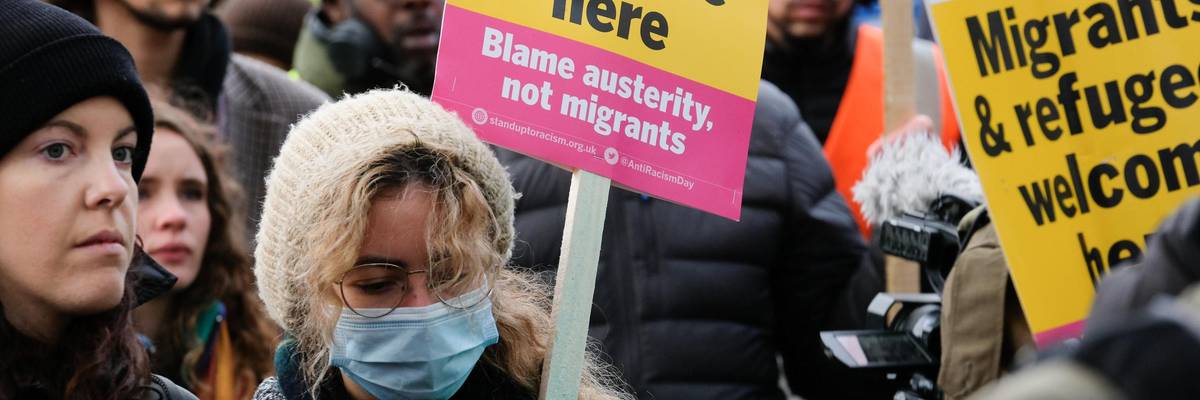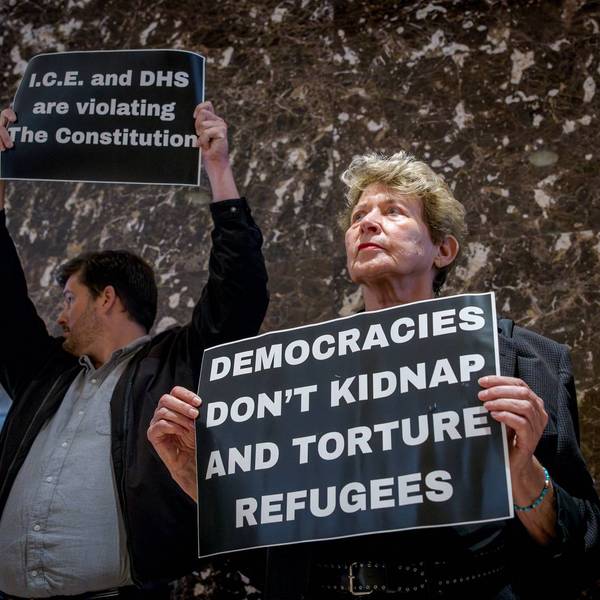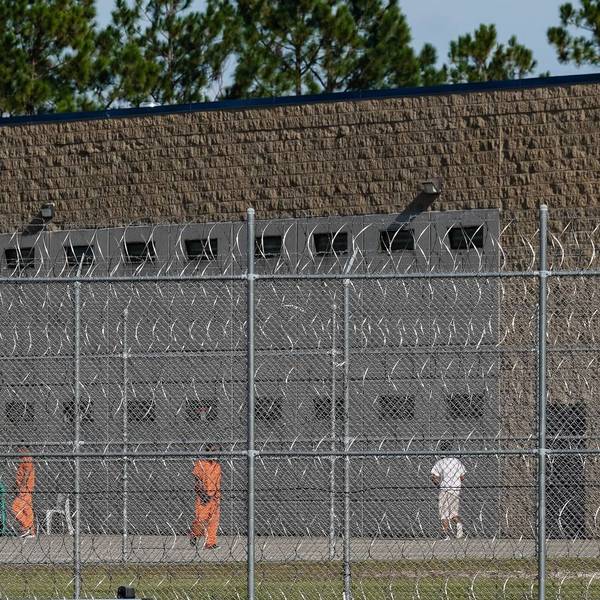
Don't Let Them Drown-Refugees Welcome protest opposite Downing Street on November 27, 2021. (Photo: Matthew Chattle/Barcroft Media via Getty Images)
Draconian UK Law Puts Vulnerable Asylum Seekers at Risk
Proposed borders bill would cause more suffering and less protection.
Perhaps the most draconian immigration bill in the United Kingdom's history is moving swiftly through parliament, currently in its final days of scrutiny in the Commons. The Nationality and Borders Bill seeks to dismantle core tenets of the international refugee regime, one which the UK helped establish. It would see vulnerable Afghans and other asylum seekers being criminalized and imprisoned for up to four years; pushed back at sea; sent abroad for offshore asylum processing, and afforded lesser rights as refugees simply for exercising their basic right to seek asylum in the UK.
Under this bill, they would face pushbacks and, if lucky enough to arrive, criminalization, and discriminatory treatment in the asylum system.
Less than two weeks ago, at least 27 people died after their boat capsized crossing the English Channel. Among those rescued and brought safely to British shores was an Afghan soldier who had served alongside British forces in Afghanistan and his family.
Under the proposed law, refugees like this Afghan soldier, would face the prospect of being pushed back at sea or taken to an offshore detention site, which have essentially become protracted black holes for refugees when used by Australia in Nauru and Papua New Guinea, and the United States in Guantanamo Bay. Many Afghans are at imminent risk and don't have the luxury of waiting to see if they'll get a place under the UK's resettlement scheme, forcing them to hastily flee by boat or on foot. Under this bill, they would face pushbacks and, if lucky enough to arrive, criminalization, and discriminatory treatment in the asylum system.
Following the Taliban takeover in August, Prime Minister Boris Johnson committed the UK to doing everything it could to support the Afghan people, in particular those who helped the UK in Afghanistan. Despite these lofty promises, the two resettlement and relocation schemes the UK government have established have been heavily criticized for being unduly restrictive both in terms of who qualifies and the number of asylum seekers the government will accept. The main scheme is not even operational more than three months after the takeover.
Upholding its commitment to protecting at-risk Afghans during the ongoing humanitarian crisis requires the UK government to expand the scope of the Afghan Relocations and Assistance Policy, immediately operationalize the Afghan Citizens Resettlement Scheme, and scrap the draconian Borders Bill. If the UK fails to do this, they will not only have abandoned vulnerable at-risk Afghans but will inflict further misery and suffering.
An Urgent Message From Our Co-Founder
Dear Common Dreams reader, The U.S. is on a fast track to authoritarianism like nothing I've ever seen. Meanwhile, corporate news outlets are utterly capitulating to Trump, twisting their coverage to avoid drawing his ire while lining up to stuff cash in his pockets. That's why I believe that Common Dreams is doing the best and most consequential reporting that we've ever done. Our small but mighty team is a progressive reporting powerhouse, covering the news every day that the corporate media never will. Our mission has always been simple: To inform. To inspire. And to ignite change for the common good. Now here's the key piece that I want all our readers to understand: None of this would be possible without your financial support. That's not just some fundraising cliche. It's the absolute and literal truth. We don't accept corporate advertising and never will. We don't have a paywall because we don't think people should be blocked from critical news based on their ability to pay. Everything we do is funded by the donations of readers like you. Will you donate now to help power the nonprofit, independent reporting of Common Dreams? Thank you for being a vital member of our community. Together, we can keep independent journalism alive when it’s needed most. - Craig Brown, Co-founder |
Perhaps the most draconian immigration bill in the United Kingdom's history is moving swiftly through parliament, currently in its final days of scrutiny in the Commons. The Nationality and Borders Bill seeks to dismantle core tenets of the international refugee regime, one which the UK helped establish. It would see vulnerable Afghans and other asylum seekers being criminalized and imprisoned for up to four years; pushed back at sea; sent abroad for offshore asylum processing, and afforded lesser rights as refugees simply for exercising their basic right to seek asylum in the UK.
Under this bill, they would face pushbacks and, if lucky enough to arrive, criminalization, and discriminatory treatment in the asylum system.
Less than two weeks ago, at least 27 people died after their boat capsized crossing the English Channel. Among those rescued and brought safely to British shores was an Afghan soldier who had served alongside British forces in Afghanistan and his family.
Under the proposed law, refugees like this Afghan soldier, would face the prospect of being pushed back at sea or taken to an offshore detention site, which have essentially become protracted black holes for refugees when used by Australia in Nauru and Papua New Guinea, and the United States in Guantanamo Bay. Many Afghans are at imminent risk and don't have the luxury of waiting to see if they'll get a place under the UK's resettlement scheme, forcing them to hastily flee by boat or on foot. Under this bill, they would face pushbacks and, if lucky enough to arrive, criminalization, and discriminatory treatment in the asylum system.
Following the Taliban takeover in August, Prime Minister Boris Johnson committed the UK to doing everything it could to support the Afghan people, in particular those who helped the UK in Afghanistan. Despite these lofty promises, the two resettlement and relocation schemes the UK government have established have been heavily criticized for being unduly restrictive both in terms of who qualifies and the number of asylum seekers the government will accept. The main scheme is not even operational more than three months after the takeover.
Upholding its commitment to protecting at-risk Afghans during the ongoing humanitarian crisis requires the UK government to expand the scope of the Afghan Relocations and Assistance Policy, immediately operationalize the Afghan Citizens Resettlement Scheme, and scrap the draconian Borders Bill. If the UK fails to do this, they will not only have abandoned vulnerable at-risk Afghans but will inflict further misery and suffering.
Perhaps the most draconian immigration bill in the United Kingdom's history is moving swiftly through parliament, currently in its final days of scrutiny in the Commons. The Nationality and Borders Bill seeks to dismantle core tenets of the international refugee regime, one which the UK helped establish. It would see vulnerable Afghans and other asylum seekers being criminalized and imprisoned for up to four years; pushed back at sea; sent abroad for offshore asylum processing, and afforded lesser rights as refugees simply for exercising their basic right to seek asylum in the UK.
Under this bill, they would face pushbacks and, if lucky enough to arrive, criminalization, and discriminatory treatment in the asylum system.
Less than two weeks ago, at least 27 people died after their boat capsized crossing the English Channel. Among those rescued and brought safely to British shores was an Afghan soldier who had served alongside British forces in Afghanistan and his family.
Under the proposed law, refugees like this Afghan soldier, would face the prospect of being pushed back at sea or taken to an offshore detention site, which have essentially become protracted black holes for refugees when used by Australia in Nauru and Papua New Guinea, and the United States in Guantanamo Bay. Many Afghans are at imminent risk and don't have the luxury of waiting to see if they'll get a place under the UK's resettlement scheme, forcing them to hastily flee by boat or on foot. Under this bill, they would face pushbacks and, if lucky enough to arrive, criminalization, and discriminatory treatment in the asylum system.
Following the Taliban takeover in August, Prime Minister Boris Johnson committed the UK to doing everything it could to support the Afghan people, in particular those who helped the UK in Afghanistan. Despite these lofty promises, the two resettlement and relocation schemes the UK government have established have been heavily criticized for being unduly restrictive both in terms of who qualifies and the number of asylum seekers the government will accept. The main scheme is not even operational more than three months after the takeover.
Upholding its commitment to protecting at-risk Afghans during the ongoing humanitarian crisis requires the UK government to expand the scope of the Afghan Relocations and Assistance Policy, immediately operationalize the Afghan Citizens Resettlement Scheme, and scrap the draconian Borders Bill. If the UK fails to do this, they will not only have abandoned vulnerable at-risk Afghans but will inflict further misery and suffering.

